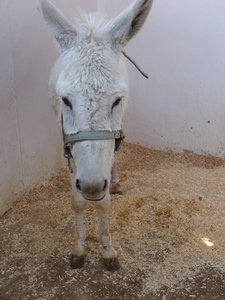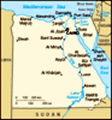Advertisement

 One of the ACE residents!
One of the ACE residents!
Recovering from a tumour on his leg. In Luxor it's not possible to go far without hearing the shouts of the horse and carriage drivers hustling for a ride, or seeing overburdened donkeys pulling carts piled sky-high with everything from sacks of grain to gas cannisters. Away from the antiquities trail, Luxor is still a working farming community and families rely on their animals to make a living. Some of these animals are in poor condition, overworked, over-loaded and underfed. Animal Care Eqypt (ACE) is there to make a difference.
We were shown around by Jan from Coventry, who's worked as a volunteer at ACE for eight years. 'I came on holiday with a friend', she explained. 'I could've turned round and gone right back - I thought men in skirts, what is this place'? And then she met one of those men, a caleche driver, who used the facilities at ACE regularly. The relationship didn't last, her love for Luxor and ACE did. 'Some people like working with children, I prefer animals'. ACE was set up to provide help for working animals- it's services are offered free of charge for their Egyptian owners. Jan cares for and feeds the animals, shows tourists around and helps out

 Al Pacino!
Al Pacino!
All of the donkeys are given names.
The tumour over Al's eye was benign. wherever she's needed. It's hard work; physically and emotionally intense. She still remembers the day - several years ago now - when a young foal was bought in. He'd caught his hoof in a railway track and badly fractured his leg. Surgical facilities are limited, and the foal was put to sleep. 'I cried all through the operation, then went home and cried some more'. Egyptians have a different mentality about animals - not the sentimentality displayed by so many Westeners. While ex-pats pay to board much-loved pets - a welcome source of income for ACE - the majority of animals in Egypt are a tool, a source of income, a means to an end. Animals are not thought to have feelings and while most Egyptians wouldn't deliberately cause an animal pain, they never pause to think about their treatment of them.
ACE is a fully functioning veterinary hospital with three full-time Egyptian vets, one volunteer UK vet, and room for thirty in-patients if animals need to be kept in for treatment. But it's much more than this. School children are given lessons in animal welfare. 'When the teacher asks how many of the children hit their donkeys, 85% of the hands shoot up. When they're asked why, they just shrug and say that's what their father and grandfather does', Jan told us. 'The penny begins to drop when the kids are asked if it hurts if they get smacked'. Children learn the donkey song. (A donkey tells of his disappointment and sadness at his owners neglect when he works so hard for him). The donkey asks for mercy with reference to teachings in the Koran. The children visit the animals and feed the donkeys and horses, to encourage them to bond with the animals and reinforce the idea that they deserve love and respect.
Ace also treats small animals, dogs and cats. Kim, one of the founders of ACE, rescued Snowy when she found a group of children swinging him around by his back legs and throwing him back and forth between themselves. Snowy, just a kitten at the time was shaking with fear. He's lived at the ACE centre ever since. To the children, Snowy was just a toy. They were not trying to hurt him, they were just amusing themselves, and without the distraction of computers and gadgets, kids will play with whatever's at hand - sometimes an old tyre or a cardboard box, and sometimes a puppy or a kitten. Pets are not unheard of in Egypt, but they're not common. Dogs are almost always kept outside; they are thought to be unhygienic and to make a person 'unclean'. Cats are more liked; but when so many men have trouble feeding their families, even the life of a loved animal is a hard one. I watched an Egyptian man feeding his cat. 'She calls to me at night. She doesn't miauw, she speaks to me, and I have to open the window and let her in'. He was feeding her small pieces of his own meal - bread. Dogs are fed old rice and scraps.
Ignorance is a great problem. Some things which cause animals pain are easily preventable like the wounds and sores caused by ill-fitting and/or poorly designed harnesses and tack. These wounds cause discomfort, and may lead to weight loss, inability to work, and eventually abandonment. Owners cannot afford to rest their animals and wounds don't get a chance to heal. Harnesses are often made from wire, or rope, or stuff collected from the rubbish. ACE has established the Harness Development Project and is working to train harness makers to make tack from local materials. Not only can the harness makers improve their earnings but improved design means an animal can work better and will live longer. Jan told us she's continually asked why she doesn't do something to help people not animals - she believes she's helping both. Studies have shown that a healthy donkey can increase a family's income by 50%! (MISSING)
Habits die hard. Firing is a traditional cure-all - commonplace in Egypt - because it's cheap, because people have little or no education, because they believe they are practising equine medicine. Firing is the practice of burning a horse or donkeys body with red hot metal. It's done mainly on the legs since it's thought this will make them 'strong'. Fat haunches are also thought to be a sign of strength for animals pulling carts, so firing under the tail is a common fate for many draught animals. It's performed without anaesthetic and is very painful for the animal. By offering free veterinary services ACE has almost managed to put a stop to this in Luxor, but the practice continues in the rest of Egypt.
Most people visit Egypt for the monuments. It's easy to concentrate on the tombs, temples and Tutankhamun and forget it's a living country with countless people struggling to live life as best as they can. Animals play a large part in the lives of these locals, but they too are often little thought of by those who work with and need them. ACE is helping to change this.
ACE is a charity in Egypt with a registered supporting charity in the UK. It's completely funded by voluntary donation. http://www.ace-egypt.org.uk In July I will be walking the 'vier-daagse' in Nijmegen, Holland to raise funds for ACE. For details please visit http://www.justgiving.com/Tracey-Bacic
Advertisement
Tot: 0.177s; Tpl: 0.019s; cc: 17; qc: 81; dbt: 0.0794s; 1; m:domysql w:travelblog (10.17.0.13); sld: 1;
; mem: 1.2mb







